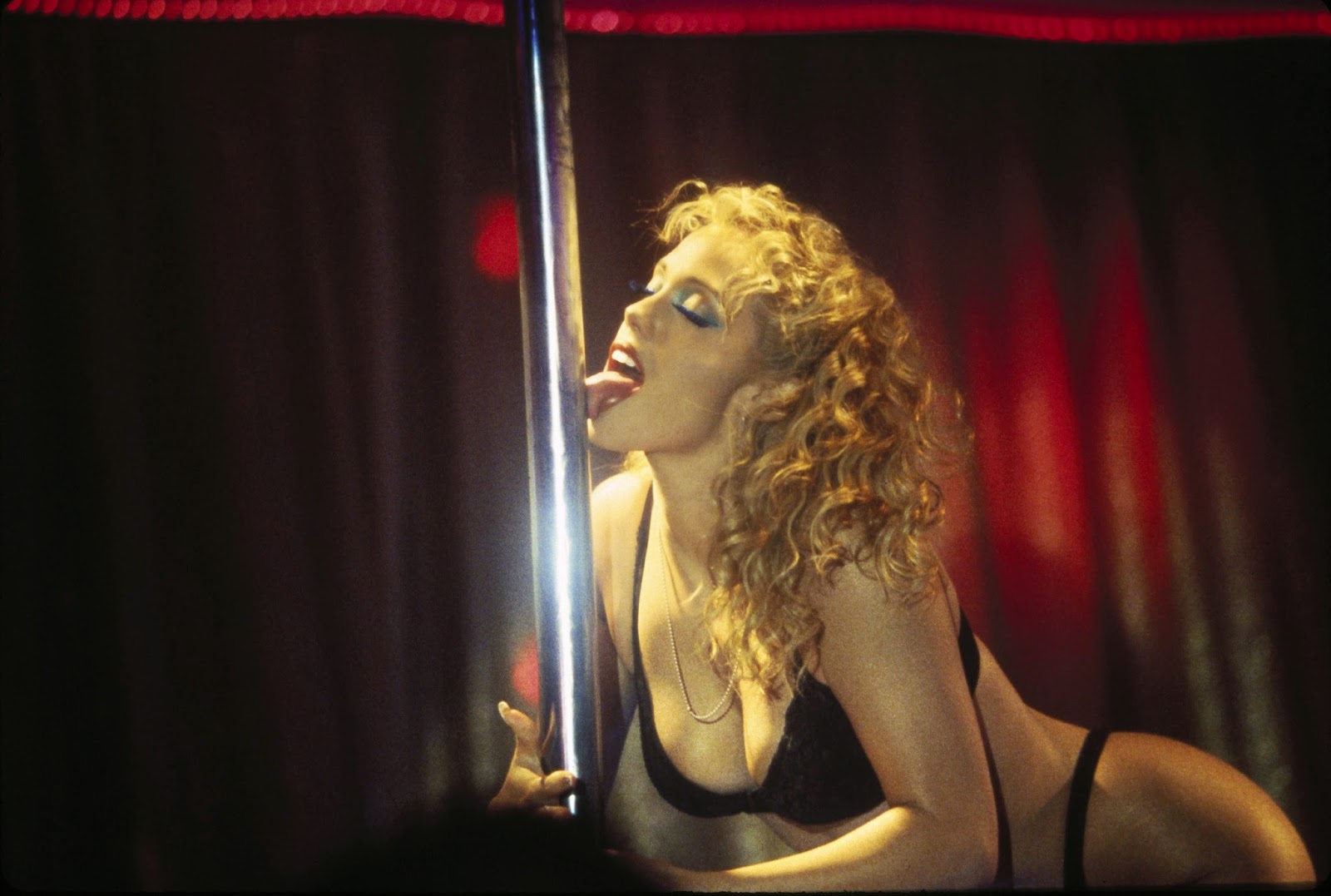Vivien Leigh doesn’t so much step through a trail of locomotive steam as she emerges in a world of opposing values. The opening shots of Elia Kazan’s “A Streetcar Named Desire” expose this facet of truth almost without conscious insinuation; because the frame is occupied by that dreamy sense of certainty that often comes with evocative black-and-white photography, our eyes are quick to notate details that seem out of place with the formality of the material. Her arrival is placated by all the traditional verbal facets of narrative engagement (a moment in which a character asks for directions while at a train station was often a staple of these sorts of movies, for example), but when she waltzes into the dimly-lit French quarter of New Orleans searching for her sister, the first memory imprint is that of streets littered in trash, and nameless onlookers that seem to be past the point of simple intoxication. While such visualizations were the stuff of those well-kept secret corners of mainstream society – at least according to the naïve historians – they had scarcely been used in the movies by that point, and never to such a blatant degree of honesty.
Saturday, November 29, 2014
Monday, November 24, 2014
Showgirls / **1/2 (1995)
When Nomi Malone marches right into the early moments of “Showgirls” dressed like a rejected stand-in at a music video shoot, it becomes the first in a long list of our observations that inspire laughter. No, not the kind that is intentional or even self-aware; this is one of countless moments that warrants unexpected chuckles based on an underlying absurdity. That the movie is not even supposed to be a comedy marks it as something of a myopic miscalculation; under the well-known influence of writer Joe Eszterhas and director Paul Verhoeven, what we observe was, in truth, once considered a genuine character drama in the hands of people dedicated enough to the work to supply it with a sense of production value. Perhaps the notion that it was all supposed to be serious was very well sold as a ploy to all those in front of the camera, but who could possibly imagine anyone behind the scenes finding sincerity in this? Who could believe that Eszterhas’ story, a tone-deaf journey through absurd female sex fantasies, had hope of being passable, much less erotic or stimulating? Here is the portrait of a woman displaced from all sense of grace and modulation, who leaves behind the unknown realities of her past and walks brazenly into the bright lights of Las Vegas with a goal to become just another object in a long line of mediocre topless dancers.
Sunday, November 23, 2014
The Hunger Games: Catching Fire / ***1/2 (2013)
There are few greater pleasures than one’s own reservations being abolished by the reveal of a genuine purpose. “The Hunger Games: Catching Fire” is that rare sequel that not only surpasses its original but also brings with it the undeniable sense that yes, finally, all the maddening chaos and underlying pathos of this deeply political story has finally revealed an important subtext. I admire it not just as an entertainment but as a persuasive statement against suggestive themes, and because it sets these ideas within an intricate world shrouded in unending gloom, those arguments are enriched beyond the knee-jerk assertion that they simply exist to create doubt in the survivability of young heroes. So often in the structure of modern adult yarns do storytellers depend on the cynical reality of some unimaginable near-future to stir the hearts of youthful adventurers into rebellious actions, and often without a plausible backdrop. This is a series that has always been well made and seemingly within an identifiable frame of reference, and yet now seems to be more than just a denial of hopeful outcomes. “Catching Fire” supplies its likeable heroes with a discernible presence that enriches the groundwork, formulates a plausible direction, engages the characters and gets us all genuinely involved without squandering our sense of hope.
Thursday, November 20, 2014
Mike Nichols, 1931 - 2014
The instinct to lead usually rises to the surface in the presence of new opportunities. For the brilliant Mike Nichols, that opportunity came in the form of a then-relatively unknown stage play called “Barefoot in the Park.” When he was handed the rights of the all-important director role for that new stage arrival in 1963 – early on in his extensive Broadway career, no less – he was marveled so tremendously by the influential connotations of the job that it informed his instincts for most of his life, at first with theater productions and then, ultimately, the movies. As revered as he was in the course of his stage career, the cinema is where his passions developed into something of remarkable profundity, and today we often cite a handful of his pictures as not just well-made undertakings but also vivid extensions of our most precious memories.
Saturday, November 15, 2014
Horns / * (2014)
“Horns” is a movie about a very unlucky guy who is accused of murdering his girlfriend, quickly cast down as a town pariah, and then wakes up one morning to discover two devilish horns growing out of his forehead without reason or explanation – although they do inspire everyone around to confide their deep dark thoughts. If only the audience were spared the exhausting nature of this mystifying predicament. Somewhere in the creative trenches of writer hell, I am sure there are filmmakers out there sifting through screenplays like this that are genuinely capable of funneling crazy material into something resembling a dedicated vision. But under the influence of director Alexandre Aja, what we get here is two hours of maddening, thoughtless exercise with misplaced assumptions; seeing it, one is left with the impression that all those involved were too committed by novelty in order to detect the necessity for some level of modulation. Indeed, an idea seeped in supernatural metaphors often requires a mind more honed into the mood of those implications in order to make them relatable to an interested viewer. This is the kind of movie that seems clobbered together under some sort of delusion that editing fixes all things, including a director’s detached sense of execution.
Thursday, November 13, 2014
The Goonies / **** (1985)
It was never just about a group of kids becoming active participants in endless swashbuckling adventure: they also had to be projections of all our relatable childhood insecurities. When Richard Donner utilized this element of suggestion during the making of “The Goonies,” that precious morsel of insight was so thoroughly concealed behind an endless display of kinetic action and ambitious visual energy that few (if any) moviegoers were observant enough to detect it; it was as if he and his writer Chris Columbus devised one of the most elaborate hidden agendas of their time. Because casual eyes are often more enamored by the presence of relentless fanfare when they go to the movies, imaginations were directly inspired here to heights vast enough to sense peripheral possibilities waiting outside the camera frame, and for well over two decades that sweeping sense of joy persisted in the minds of anyone who dared to recall the great possibilities of youthful escapades. But when wonder fades from the senses and is replaced by the sting of individual being, what point does a movie about a gathering of silly kids searching for a pirate treasure have to say?
Tuesday, November 11, 2014
Bad Johnson / 1/2* (2014)
Nothing gets a man in trouble quite as often (or as severely) as his penis. While some members of the male species have successfully mastered that ever-so-daunting task of taming the mischievous trouser beast in all things sexual or romantic, countless others have allowed it to roam free and wreak havoc just about everywhere it goes without regard to consequence. The source of the problem is, I suspect, a linkage failure between anatomical functions; because neither the brain nor the groin are exactly eager to communicate with one another in such regards, they create perplexing gray areas in which destructive patterns often manifest. A good man will allow an enlightened mind to dictate his actions; a bad one will abandon reason and get caught up in the rush of a cheap thrill. And as always, there’s also those conflicted types – guys who indulge in the pleasures of the flesh but are conscious enough of their efforts to stand back and examine their place once it becomes apparent that their brash chutzpah is leading them down very unforgivable paths.
Saturday, November 8, 2014
Big Hero 6 / *** (2014)
Disney’s newest CGI cartoon, the comically-charged “Big Hero 6,” plays like a union of opposing sensibilities. In one regard, the movie’s use of high style and energy are stirred right from the same place of heart that inspired some of the most ambitious feature cartoons over the years: consistently colorful and filled to the brim with astounding sights, it emphasizes the continued prowess of computer animators who see their canvas as only the tipping point of total visualization of their imaginations. On the other hand, the narrative structure does not rise from that internal spark of traditional animated storytellers; instead, what we find on screen are the all-too-familiar mechanics of comic book storytelling, in which plucky adventure is fueled not by whimsy but by the deep-seeded notion that tragedy must befall an assemblage of characters in order to push them to the limits of their being. The primary hero of the picture, a science and robotics guru named Hiro, endures the obligatory journey of adolescence but is not caught in that whirlpool of simplified youth sentiments to make him easily identifiable to the youngest of audiences, and when there is a moment that requires him to stare down the source of his trauma and resort to a knee-jerk decision, he seems less like the hero of a cartoon and more like an early representation of a Bruce Wayne or Peter Parker.
Thursday, November 6, 2014
Gone Girl / **** (2014)
If the dark and moody “Seven” declared the arrival of an exciting film provocateur, then “Gone Girl” sees his audacity realized to the peak of possibility in the frames of one of the most fearless entertainments of recent memory. Under the guidance of the remarkable David Fincher, this is one of those rare, elusive endeavors that contains nearly every important quality I cherish about moviemaking: high enthusiasm, a sense of presence, unending energy, technical craftsmanship, devious performances, wicked chemistry and dialogue, and that all-important cognizance that allows its players to navigate an intricate psychological web with some level of premeditation. When one considers all these virtues within the frame of reference of a picture that takes some perverse pleasure in pulling as many rugs out from underneath the audience as possible, what we are left with also has the capability of inspiring some level of nostalgia: as a confident thriller that dodders between the macabre and the humorous, it beckons comparisons to the most delicious of Hitchcock’s classics. That’s almost as shocking a reality as it is a rewarding one. While studios are all about the tease and nothing about full realization in our present grind through 21st century cinema, at last here is a brilliant movie that knows manipulation is going on in nearly every pass of action, any yet never backs down from any of its many fearsome implications.
Subscribe to:
Posts (Atom)








.jpg)
